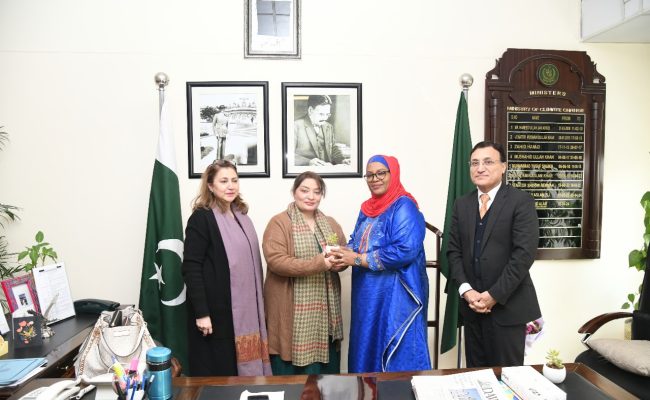
Rwandan ambassador Fatou Harerimana on Wednesday highlighted the potential of bilateral cooperation between Pakistan and Rwanda in climate change, water conservation, smart agriculture, disaster management, emphasising the need for enhanced collaboration.
During her courtesy call-on meeting with Prime Minister’s Coordinator for Climate Change, Romina Khurshid Alam held here in the climate change and environmental coordination ministry, she said there is a need to expand bilateral collaboration and cooperation in environment, climate change and disaster management, adding that the two nations enjoy friendly relations supported by mutual respect, growing economic ties and cooperation in various sectors.
During the meeting, both sides also highlighted the growing urgency for bilateral cooperation as a part of the international collaboration to tackle the common challenges of climate change, environmental degradation, heatwaves, droughts and water scarcity, with both leaders reaffirming their commitment to national and global sustainability.
“Rwanda and Pakistan, with a longstanding relationship spanning sixty-two years, actively collaborate in various fields, including trade, health, and investment. But, now environment, climate resilience building, water conservation, disaster risk management, heatwave, drought and desertification are the areas which offer a huge potential for both the countries to collaborate,” the Rwandan ambassador Fatou Harerimana said.
Ambassador Harerimana and the PM’s climate aide explored and discussed several possible areas of cooperation, including the sharing of expertise, joint research initiatives and the implementation of green technologies to promote sustainable development.
“Rwanda is committed to playing a significant role in the global effort to combat climate change. Our partnership with Pakistan will not only strengthen our climate resilience but also pave the way for practical, actionable solutions that can be applied across the developing world,” Ambassador Harerimana stated during the meeting.
Highlighting Rwanda’s commitment to climate action, the ambassador informed the PM’s climate aide Romina Khurshid Alam that Rwanda is recognised as a global leader in environmental sustainability, with a track record of progressive policies aimed at reducing emissions and promoting renewable energy. The country’s efforts, particularly in reforestation and conservation, have earned international recognition, the envoy added.
The two leaders also discussed the impact of climate change on agriculture, water resources, and biodiversity in both countries, emphasizing the importance of innovative solutions to mitigate the environmental challenges faced by their populations. Both nations acknowledged the importance of sustainable agriculture, renewable energy, and ecosystem restoration in their efforts to reduce carbon footprints.
The coordinator to PM Romina Khurshid Alam expressed gratitude for Rwanda’s willingness to collaborate and noted that the partnership would provide valuable insights into climate adaptation strategies that can be tailored to Pakistan’s unique challenges.
“Pakistan is facing significant climate challenges, and strengthening ties with Rwanda presents an opportunity to develop a more resilient and sustainable future,” Romina Khurshid Alam remarked.
The collaboration between Rwanda and Pakistan will be formalised through an agreement outlining key areas of cooperation and mutual support in climate action, with the aim of contributing to the achievement of global environmental goals, including the United Nations’ Sustainable Development Goals (SDGs) and the Paris Agreement.
Both nations pledged to continue working together and advocate for climate justice on the international stage, ensuring that vulnerable communities are supported as they confront the realities of climate change.
Sharing Pakistan’s climate risk management policies and programmes, Romin Khurshid Alam told the Rawandan Ambassador Fatou Harerimana that the Pakistan is ranked among the countries most affected by climate change, facing extreme weather events, water shortages, and flooding.
“Under the leadership of the Prime Minister Shehbaz Sharif, the present government taking all-out efforts and is actively working to integrate climate change policies into national development plans and build climate resilience at the community level,” the PM’s climate aide remarked.
Climate Change and Environmental Coordination Ministry Secretary Aisha Humera Moriani said that given the inspiring experience of Rawanda in implementing climate risk management initiatives, there exists significant opportunities of collaboration and cooperation between the two countries in environment and climate change.
“Both countries are facing different common climate change-caused risks including floods, droughts, desertification, water scarcity, shifting rainfall patterns, which underlines need for the Rawanda and Pakistan to enhance collaboration to address these challenges and enhance climate resilience of the people, their lives and livelihoods as well as ecosystems, she remarked.
Additional secretary at the Climate Change and Environmental Coordination Ministry, Zulfiqar Younus informed the Rawandan ambassador that the ministry recently launched Pakistan’s Carbon Market Policy on the sidelines of COP29 in Baku to attract “green investments” and achieve “environmental sustainability” .
“Under the policy, Pakistan is ready to collaborate with local and international stakeholders for the development of carbon markets to attract investment for its climate goals. Besides, we also aim to accelerate clean technology deployment and attract investment in sectors and projects with significant emissions reduction potential, including energy, agriculture, waste management, and forestry”, the climate change official informed the meeting.
He also offered the Rawandan ambassador to join with Pakistan in setting up carbon markets.The country was ready to work with “partners and collaborators interested in jointly setting up carbon markets to make this national carbon market policy not just functional but transformative as well, Zulfiqar Younus, the additional secretary at the Climate Change and Environmental Coordination Ministry, remarked.


